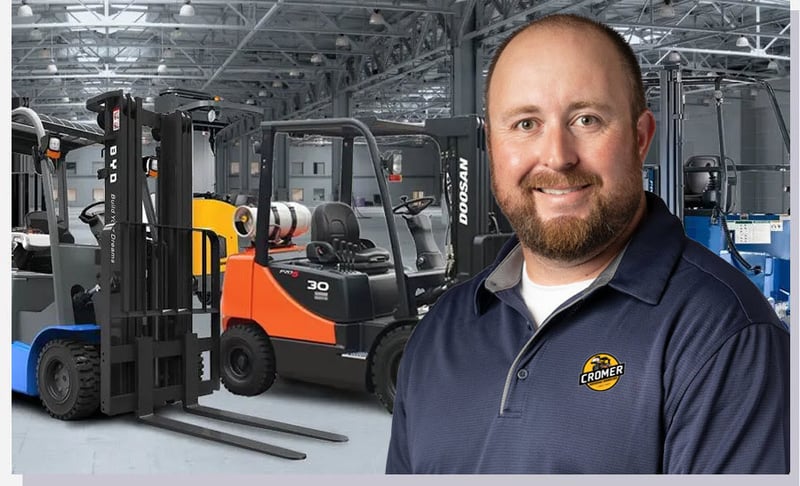 Doug Perez
Doug Perez What does the future hold for California Forklift Buyers? Insights from Cromer’s General Manager, Doug Perez
6131 S. Lincoln Ct
Fresno, CA 93725
Phone: 707 588-5900
Fax: 707 588-5909
http://www.cromer.com
Doug Perez serves as General Manager of Cromer Material Handling, and has worked in the material handling industry for over 20 years. Right now, our industry faces a number of big changes, coming fast and disrupting our processes. Doug wanted to offer his thoughts on these changes, what forklift buyers & operators should expect, and how Cromer is working to help.
“In recent years, the material handling industry suffered an inventory shortage. Is the situation better today?”
It’s better, but we still see big delays. Some forklift brands are on backorder for over one year out, due to component shortages.
If you need something now, I recommend considering other forklift brands. You may discover a new favorite. If you want to stick with your current brand, be sure to place your orders in advance so that you’ll get them when your current forklifts are ready to retire.
“What are the lead times by forklift brand, generally speaking?”
The Doosan and BYD electric forklifts carry a pretty quick lead time now, within six-eight months.
Donkey’s managing delays well, too. We have a constant supply of Donkey piggybacks now.
For our more specialized forklifts, Combilift narrow aisles take around 12 months. Princeton trailer mounts have a lead time of 12 months. Sellick’s rough terrain forklifts are available in six-eight months.
“How is electric forklift adoption going?”
We see more interest now than ever before. Currently, about 40% of our forklift sales are electric. Some companies have swapped a percentage of their fleet for electrics; while others went all-in and already see success. In our experience, the biggest change is teams switching their refueling process from filling a tank to charging a battery.
“For those customers who need to hold onto equipment longer than they normally would, what would you recommend?”
The only way to extend the life of your equipment is to keep it maintained. Deferred maintenance is common among forklift fleets. Right now, this could spell a lot of trouble. If a forklift breaks down, and you can’t repair it fast, you’re stuck waiting on new equipment. That could spell weeks of lost operation time or forklift rental fees.
I’d suggest having your maintenance tech check the forklift once a quarter for wear on parts. (They should anyway.) Replacing parts once worn – and before they break – will extend the forklift’s usable life. Alternatively, have a Cromer service tech evaluate your fleet & recommend a maintenance schedule for the coming year.
“What challenges would you say warehouses & distributors in the California area face?”
Equipment delays have bottlenecked some orders, as I said, but our California customers have another challenge in front of them.
We’re constantly faced with legal expectations from CARB, the EPA, and the State of California. They all relate to emissions and grid-related efficiencies.
CARB has already implemented a plan to require zero-emissions vehicles for cars & trucks by 2035. What you may not know is they’re working on plans to require the same standard for forklifts soon.
Their new rules could require forklift manufacturers to sell only electric forklifts in California by January 1, 2026 (the date’s subject to change).
In other words, CARB may soon prevent the sale of any non-electric forklift in California. LPG forklifts will age out of usability from there.
Hopefully, the same people making these new rules are working with power companies to make sure our electric grid can support the extra load.
“What does Cromer do to help its customers meet these challenges?”
It comes down to equipment offerings. With the Doosan and BYD lithium forklift lines, over $25M in rental assets, over 100 techs to service your equipment and multiple finance options, we’re able to meet any requirement.
On a service level, I believe what sets Cromer apart is our professionalism, experienced team, and technical training.
“If you could tell all California businesses one thing they should know about material handling in 2023, what would it be?”
This is a good year to identify your key business partnerships and make changes based on their ability to educate you on the industry’s future. It really comes down to who has readily-available products to ease your equipment challenges, and who’s willing to help you adapt to the coming changes. At Cromer, we’re here to make your life easier.









